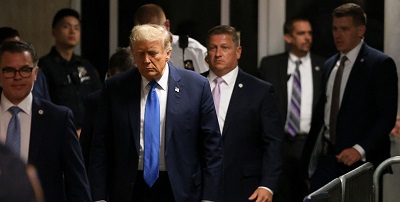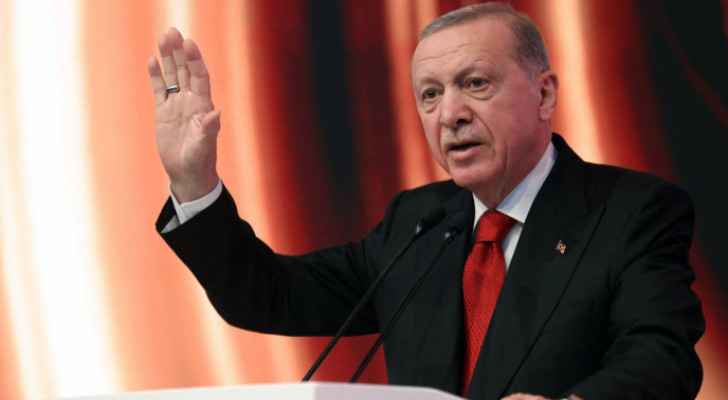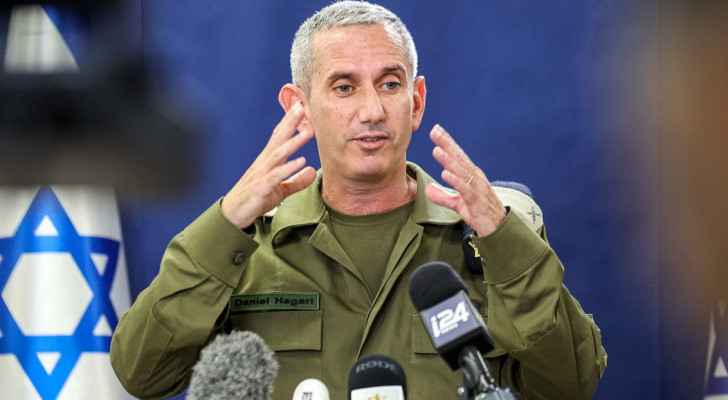A disastrous scenario stares Tehran in the face - By Nadim Koteich, Asharq Alawsat.
The 4th of November will be remembered as a glorious day of confrontation with the Iranian regime. The re-imposition of US sanctions is the last thing Tehran would have wanted to face at the moment when it is going through its largest “revolutionary” expansion in the region and one of the most critical of its domestic situations since 1979.
Iran's problem with US President Donald Trump issues from the clarity of the man. He had stated in his presidential campaign that the nuclear agreement is the worst deal in history, and that he would revoke it if he won the presidency. He has done exactly as he had promised.
The Trump offensive
Trump is also honest when he says he wants good relations with Iran. His only demand is actually quite simple: Iran should stop being the way Iran is. Trump does not know how to use Kissinger’s equations like the phrase “it is necessary for Iran to transform from being a revolution into becoming a state.” His advisors do not have the imaginative literary and narrative techniques such as those possessed by former President Barack Obama's adviser Ben Rhodes, who had written about Tehran's tight grip and Obama’s open hand to greet the Iranians.
Trump speaks a different language, a simpler and a more interactive one. You give me something and I give you something back and when this does not work, he says, as he told the North Korean president: “My nuclear button is bigger than yours.”
Trump really wishes to see an Iran that is different from the one we know now. He sees in Iran a huge market that needs everything from cotton socks to oil refineries and all that lies in between. He also sees its tourism potential and its role for bringing stability in Asia as well as a gateway to solve other intractable problems in this part of the world — from Israel's security, to solving the intractable peace crisis, alleviating the climate of extremism and terrorism and extinguishing many of the wars that have come to threaten the security of a united Europe because of their displaced victims. This is the most important transatlantic American security achievement after World War II.
Trump is not an ideological man. What he really wants is to reach a new agreement that opens the door to a new Iran. He is not seeking to change the regime, though some inkling of this idea has started to emerge in his administration via the remnants of the George Bush administration, particularly through national security adviser John Bolton. It is not his goal to provide credentials to anyone in the name of America to change its image, as Obama’s concern was and who thought that the world would change if he just finds the right words to address it.
Economic slump
Trump’s policy is as simple as the Iranian crisis. He does not have a doctrinal rhetoric that can be confronted with a doctrinal rhetoric, and he is only asking the regime the same things that the Iranians themselves are asking of their regime.
It is unfortunate for the regime that these oil sanctions –oil is the backbone of the Iranian regime as it feeds 80% of the treasury's revenues – comes at a time characterized by two factors. The first one is a global economic slowdown and a series of currency crises stretching from Argentina to Turkey. This means the decline of demand on oil. Second, expectations of surpluses in oil supplies in the first half of 2019 comes from either a rise in Saudi and Russian output to protecting prices from harmful hikes, or the introduction of new producers or barrels from non-traditional producers such as Canada and the US. The environment surrounding American sanctions guarantees drying up of Iran's oil revenues and protecting current oil prices and preventing them from going up and threatening global economic disasters. In addition, there are temporary exemptions granted by the Trump administration to eight countries to continue buying Iranian oil, which do not benefit Iran but are placed in special accounts within the procuring state and in the local currency and are only used to pay Iranian bills for food, drugs and materials that are not subject to sanctions.
Iran’s options
A disastrous scenario stares Tehran in the face and it stipulates that Tehran may resort to escalation in Bab al-Mandeb and the Strait of Hormuz to create a militarily tense environment threatening oil trade and increasing oil prices in the hope that the world will turn against the United States. About 12% of the total international trade passes through Bab al-Mandeb, and in 2016 the strait was a gateway for 4.8 million barrels of oil per day, of which 2.8 million barrels of oil per day headed towards Europe. In 2016, the Strait of Hormuz accounted for more than 30% of the total trade of crude oil and liquid gas transported overseas. But any untoward incidents in Bab al-Mandeb and the Strait of Hormuz, or any obstruction of Saudi and UAE transport pipelines in that spot and striking the bases of the Trump plan, will push Europe into America's lap and not the other way around and will prove to the world that Iran is indeed the irrational state that Trump had warned of. Tehran may thus subject itself to a direct military strike launched against it by the Trump administration.
The second option, which is the most likely one is that Iran will swallow the bitter pill of sanctions and lick its economic wounds for the next two years in the hope that the term of Trump will end and he won’t return for a second term. Tehran will then move on to negotiate with the new US administration by the end of 2020. Iran believes it has the time, but the reality on the ground indicates otherwise.
Latest News
 Prosecution lays out ‘criminal conspiracy’ in historic Trump trial
Prosecution lays out ‘criminal conspiracy’ in historic Trump trial King from Madaba: Jordan has always proven its ability to move forward with persistence of Jordanians
King from Madaba: Jordan has always proven its ability to move forward with persistence of Jordanians Safadi discusses war on Gaza with French, German delegations
Safadi discusses war on Gaza with French, German delegations Erdogan arrives in Baghdad for first official visit since 2011
Erdogan arrives in Baghdad for first official visit since 2011 “Israeli” army says it approved plans for “continuation of war in Gaza”
“Israeli” army says it approved plans for “continuation of war in Gaza”
Most Read Articles
- Safadi discusses support to Syrian refugee with DRC
- King, Kuwait emir reaffirm pride in deep-rooted relations
- Israeli Occupation aggression on Gaza enters 200th day
- UNRWA’s role in Gaza indispensable — Foreign Ministry
- Jordan condemns Israeli 'war crimes' in Gaza, calls for accountability
- General Motors lifts 2024 profit forecast after strong Q1
- The ideological coup: How disciples of Kahane became the new face of Israel - By Ramzy Baroud, The Jordan Times
- Azerbaijan says ‘closer than ever’ to Armenia peace deal amid border talks
- Baby delivered from dying mother's womb in Gaza 'miracle'
- King orders holding parliamentary elections in accordance with law, checks on electoral commission’s preparations